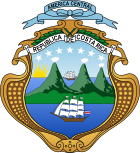Visa policy of Costa Rica
 |
|---|
|
|
Visitors to Costa Rica require a visa unless they are citizens of one of the eligible countries who are visa exempt up to 90 days. Costa Rican visas are documents issued by the Dirección General de Migración y Extranjería, dependent on the Ministry of Foreign Affairs of Costa Rica, with the stated goal of regulating and facilitating migratory flows. Visitors must hold passports that are valid for at least 6 months from the date of arrival.
Visa policy map

Visa exemption
Holders of passports of the following jurisdictions do not require a visa to visit Costa Rica:[1][2][3]
|
1 — passport must be valid for at least one day on arrival.
2 — passport must be valid for at least three months on arrival.
3 — including overseas territories of Australia, Denmark, France, Netherlands, New Zealand, Norway, United Kingdom, United States.
Nationals of ![]() China holding passports for public affairs do not require a visa for a maximum stay of 30 days.
China holding passports for public affairs do not require a visa for a maximum stay of 30 days.
| Date of visa changes | ||
|---|---|---|
Cancelled:
|
Visa is not required for holders of diplomatic or service/official passports of China, Colombia, Cuba, Dominican Republic, Ecuador, Indonesia, Morocco, Thailand and Vietnam.
Substitute visas
Nationals who would normally require visas may enter Costa Rica for a maximum of 30 days if they are holding a valid, multiple-entry visa or residence permit issued by the following countries. When utilizing a residence permit, it must be valid for more than six months on arrival.[2]
1 - for holders of residence permits only.
2 - Green Cards or U.S. visas must be valid for more than six months on arrival except for holders of B or D visas. Not applicable to holders of C1 visas.
Visa required countries

Holders of passports of the following jurisdictions require a visa to visit Costa Rica:[1]
- Visa issued at a consulate and a passport valid for six months
- Restricted visa approved by the Commission for Restricted Visas and a passport valid for six months
Visitor statistics
Most visitors arriving to Costa Rica were from the following countries of nationality:[18]
| Country | 2017 | 2016 | 2015 | 2014 | 2013 |
|---|---|---|---|---|---|
| 1,199,241 | 1,233,277 | 1,077,044 | 997,262 | 929,402 | |
| 429,990 | 440,049 | 446,870 | 463,959 | 476,678 | |
| 201,921 | 188,104 | 175,771 | 172,730 | 160,398 | |
| 106,783 | 94,499 | 84,940 | 75,045 | 72,568 | |
| 104,795 | 99,917 | 97,135 | 68,340 | 98,275 | |
| 81,091 | 78,273 | 69,427 | 63,214 | 64,552 | |
| 78,032 | 65,063 | 57,600 | 55,677 | 56,756 | |
| 76,173 | 71,392 | 47,499 | 39,545 | 35,198 | |
| 70,960 | 67,939 | 66,450 | 63,916 | 54,754 | |
| 69,803 | 61,503 | 54,773 | 49,681 | 39,728 | |
| 69,782 | 67,453 | 65,188 | 64,303 | 52,950 | |
| Total | 2,959,869 | 2,925,128 | 2,660,257 | 2,526,817 | 2,427,941 |
See also
References
- ^ a b "Circular DG-0042-11-2016" (PDF) (in Spanish). Dirección General de Migración y Extranjería. 7 November 2016. Retrieved 11 December 2017.
- ^ a b "Visa and passport". Timatic. International Air Transport Association through Emirates. Retrieved 1 April 2017.
- ^ "ALCANCE N° 272" (PDF). La Gaceta Diario Oficial (in Spanish). Imprenta Nacional. 28 November 2016. Retrieved 11 December 2017.
- ^ "REPORT FROM THE COMMISSION TO THE EUROPEAN PARLIAMENT AND THE COUNCIL on cases where visa waiver non-reciprocity is maintained by certain third countries in accordance with Article 1(5) of Council Regulation (EC) No 539/2001 listing the third countries whose nationals must be in possession of visas when crossing the external borders and those whose nationals are exempt from that requirement, as amended by Regulation (EC) No 851/2005 as regards the reciprocity mechanism - COM(2006) 568 final". European Commission. 3 October 2006. Retrieved 11 December 2017.
- ^ "THIRD REPORT FROM THE COMMISSION TO THE EUROPEAN PARLIAMENT AND THE COUNCIL on certain third countries' maintenance of visa requirements in breach of the principle of reciprocity in accordance with Article 1(5) of Council Regulation (EC) No 539/2001 listing the third countries whose nationals must be in possession of visas when crossing the external borders and those whose nationals are exempt from that requirement, as amended by Regulation (EC) No 851/2005 as regards the reciprocity mechanism - COM(2007) 533 final". European Commission. 13 September 2007. Retrieved 11 December 2017.
- ^ https://treaties.un.org/doc/Publication/Monthly%20Statement/1982/01/monstate.pdf
- ^ https://treaties.un.org/doc/Publication/Monthly%20Statement/1968/12/monstate.pdf
- ^ https://treaties.un.org/doc/Publication/Monthly%20Statement/1968/11/monstate.pdf
- ^ https://treaties.un.org/doc/Publication/Monthly%20Statement/1971/11/monstate.pdf
- ^ "PDF.js viewer". www.pravno-informacioni-sistem.rs. Retrieved 2 April 2018.
- ^ "一部査証及び査証料の相互免除に関する日本国政府とコスタ・リカ共和国政府との間の取極(口上書)" (PDF). Ministry of Foreign Affairs of Japan. 2 October 1974. Retrieved 14 February 2018.
- ^ https://treaties.un.org/doc/Publication/Monthly%20Statement/1996/12/monstate.pdf
- ^ https://treaties.un.org/doc/Publication/Monthly%20Statement/2005/05/monstate.pdf
- ^ p.25-26
- ^ https://treaties.un.org/doc/Publication/Monthly%20Statement/2017/06/monstate.pdf
- ^ p.9-14
- ^ [1]
- ^ "Informes Estadísticos - Anuarios" (in Spanish). Instituto Costarricense de Turismo. Retrieved 11 December 2017.

